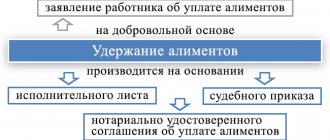You can achieve parental support not only for young children, but also for an adult child. The grounds for alimony for an adult son/daughter, the payment procedure, terms and other points are described in the Family Code of the Russian Federation.
If the child received financial support before this, upon reaching the age of 18, any mandatory payments from parents cease completely. If there are grounds for calculating alimony, you must file a new claim in court.
It makes sense to contact a judicial authority to resolve the issue of financial support only if it was not possible to sign an agreement by reaching an amicable agreement with the parent (one or both).
The amount of child support does not depend on the child’s disability group.
Is there a procedure
You can force a person to pay alimony after he reaches the age of majority, of course, if his paternity is proven. This is due to the fact that in our country, civil liability comes into force only after a citizen reaches 18 years of age, becomes emancipated, or enters into an informal marriage relationship. As long as the father is considered procedurally incompetent, his parents, trustees or guardians will take part in court proceedings. At the same time, the court does not take their point of view regarding the establishment of paternal rights into account.
The guardianship and trusteeship authorities have the right to recognize the new father as capable of becoming a participant in the court as a defendant, provided that he has an official income and is a physically healthy person.
Otherwise, his parents and grandparents become defendants. If the mother grew up in a dysfunctional family, then her interests are represented by social care services.
Child support for adult children studying at a university
Family law clearly indicates cases when alimony payments are possible. Regarding whether payments should continue while the child is studying at a higher educational institution, the legislator has tried several times to make adjustments.
Thus, in 2013, a bill was created, according to which the obligation of parents to pay child support is established after the age of 18, if the child is studying, that is, until he reaches the age of 23.
The bill was not approved and last year another draft was submitted to the State Duma to strengthen guarantees for children to receive payments during their studies, until they reach 24 years of age. But such a legislative act also did not find support and remained valid only on paper. An adult can receive payments for the period of study if he meets the criteria specified earlier.
The necessary conditions
In our country, citizens can tie the knot from the age of 16. The legislation defines this stage of life as the moment of full legal capacity.
If a teenager has children at this age, all responsibilities for raising him fall on his shoulders.
If he cannot fully cope with parental responsibilities, then the court appoints a guardian. He will bear full responsibility until the parents reach adulthood.
Parental responsibilities and rights arise for adolescents after the birth of a baby. As for the mother, no questions usually arise here - she is noted on the child’s birth certificate at the time of discharge from the maternity hospital. The situation with dad is much more complicated, since only he himself can confirm paternity. If the father does not give his written consent, the matter will not progress. Then the only hope remains only in court. The trial is carried out only with citizens at least 14 years old, and lasts quite a long time.
How to file for alimony without divorcing your spouse? The answer is presented in the article “How to file an application for alimony while married.” Is it possible to receive child support retroactively? Find out here.
Parental responsibility and rights of children under 14 years of age
Children are considered minors from birth to 14 years of age. Responsibility for their upbringing, development and financial well-being falls entirely on the shoulders of the parents.
Material damage caused by a teenager at a given age to third parties must also be paid for from the funds of the father, mother or guardian. The criminal code does not apply to children at this age.
Children over 14 years of age have the right:
- Grow and develop in your family. Be a full member of it, communicate with all relatives and express your opinion on all family issues.
- To protect his interests in cases of infringement of his rights and the use of cruelty on the part of his parents.
- To receive financial support (receipt of benefits, alimony).
- For free education and medical care, which are provided in accordance with the articles of the Constitution of the Russian Federation.
- Free travel on public transport is provided to children under 7 years of age.
- Having reached 10 years of age, the opinion of the minor is taken into account at court hearings. For example, when determining his place of residence, in the event of parental divorce.
Obligations of the parties
Demanding child support from a minor parent is permitted at the legislative level.
The obligation to support children applies to all parents, regardless of their age. Lack of money and unwillingness to provide for the child does not cancel this condition.
If the parties fail to reach an agreement peacefully, then the court comes to the rescue. The right to receive money is granted to the parent or guardian with whom the child lives. If he does not want to take part in the registration of alimony, this violates the rights of the child. Because of this, he becomes disadvantaged in material goods.
Sometimes this arises due to the desire of one party to break any connection with the other half. If this happens, then the initiative will pass to the guardianship services. However, the father can always challenge the court's decision recognizing his paternity. This is possible if the following reasons occur:
- other deductions from the father’s income;
- presence of disability or serious illness that has become an obstacle to work;
- emancipation of a child, his employment or running his own business;
- property generating stable income;
- providing the child with the state budget.
Particular attention should be paid to the last condition. If the child’s needs are met from the state budget or he is a pupil of an orphanage, even the court will have a difficult time collecting the elements from his parents. Here inequality arises between other children, since some do not have parents.
Coming of age
Coming of age in Russia occurs at the age of 18, although in different countries of the world people who turn 19, and sometimes 21, are considered adults. It is from this moment that full legal capacity begins.
A citizen can without hindrance purchase alcohol and tobacco products in stores and appear on the street at night without being accompanied by an adult. At any age, a teenager can be left an inheritance, but he will be able to receive it according to the law only upon reaching the age of 18, when his full legal capacity begins.
To do this, you need to issue an appropriate certificate. If the testator and the heir lived in different places, he will have to go to the city where his benefactor lived and do the paperwork there.
Watch the following video about the rights of teenagers:
Are there any differences between types of marriage?
The responsibilities of parents to their child largely depend on whether their relationship is officially registered.
Marriage relationships allow spouses to raise their child together and live together in the same living space. Here, the fact of paternity is established automatically and does not require proof.
The process of collecting alimony from a minor father or mother is similar to the standard procedure: teenagers can agree among themselves on the payment of money for the maintenance of the baby. Otherwise, one of them goes to court to create an appropriate order. In the same way, alimony is collected if he recognized his child and was recorded in the paternity certificate.
It is worse if the father does not accept the newborn, and there is no official marriage between the parents. The first step here is to establish paternity. For this purpose, a lawsuit is being filed. It can be issued by the child’s mother, her guardian or another authorized person who is maintaining the child. The legislation does not provide a statute of limitations for this issue, so the mother can apply again and again.
To achieve the truth, the court uses various methods. Medical examination is considered the most effective. However, Russian legislation does not classify its results as essential evidence, so they are always considered together with other facts. Because of this, based on the information from the examination, the bailiffs do not announce a decision, since other grounds must also be present. There are two important points here:
- a claim to establish paternity is not considered if the father is under 14 years of age;
- if the teenager stubbornly resists, it is quite possible that the court will render a verdict based on refusal.
Methods of transferring alimony: which is the most optimal? The answer is presented in the article “How child support is transferred.” You can find out how you can reduce child support here.
Debt release
The payer may be released from his obligations to repay the debt. There are several reasons for this:
- The recipient of alimony waived the right to collection. We are talking about a child who has reached adulthood. He can forgive parental debt, even if the other parent does not agree. The main condition is that the adult recipient must be legally competent.
- The alimony collector (guardian) on his own initiative suspended the payment of alimony. This can be done by revoking the writ of execution or terminating the agreement. And during this period you cannot demand payment of the debt.
- The payer allowed the debt to arise for valid reasons. For example, alimony was not paid due to serious illness, disability and other life circumstances. In this case, the court may reduce the amount of debt.
In some cases, it is impossible to collect alimony debt. For example, if the payer transferred expensive property to the child. Or if he paid, the alimony is unofficial and cannot confirm this, but the plaintiff does not have a writ of execution or an agreement on alimony.
Where are funds withheld?
Child support can be collected from the following types of income:
- from wages, including revenue, allowances, etc.;
- bonuses and incentives;
- pensions;
- scholarships;
- unemployment benefits;
- dividends received from any type of real estate;
- income from business activities;
- financial benefits for the military;
- from the income of the convicted person.
If his official representatives evade alimony obligations, debt collection proceedings are opened. Sometimes the debtor’s personal property is seized and he is charged with an administrative violation. These steps were created by the state in order to provide the child with a decent standard of living, without which healthy and full development is impossible.
Options for collecting child support from a minor parent
The state can recover up to 70% of the funds, since all children have equal rights to financial support. The responsibility to provide for the child falls on both parents, regardless of the region in which they live. The parental shares contributed must be equal, even if the marriage is dissolved.
Voluntary order
If the parents manage to agree on the payment of child support, they can draw up a written agreement between themselves indicating the monthly amount that the party will pay.
In order for the terms of the agreement to become legally significant, the agreement is certified by a notary.
Judicial
Unfortunately, the parties are rarely able to reach an agreement, since often one parent chooses to evade parental responsibilities. Only the court has the right to force the father to answer for his actions. If for any reason both parties do not fulfill their obligations, then the department of social protection and guardianship may take up the issue.
An application for child support can be sent to the judge along with a claim to establish paternity.
Payments are assigned by the judge from the moment the conditions are presented. Before forcing a teenager to pay child support, the court considers the following obligations:
- the child for whom the finances will go must need help and such support;
- the father must have money.
The legal process is initiated after the submission of a statement of claim from the minor mother and her official representatives. The text of the document contains the following data:
- information about whom the claim is being filed: full name and name of the court. District courts are responsible for hearing such cases;
- applicant's passport information and mother's personal data;
- confidential information of the defendant;
- the situation that caused the application to court;
- list of attached documents;
- date and personal signature of the mother or her representative.
The claim for the award of alimony payments must be accompanied by a birth certificate of the child and mother, as well as an original and a photocopy of the passport.
Costs of inheritance for a minor
Heirs who have not reached 18 years of age by the day the inheritance is opened are exempt from paying state fees for issuing a certificate of inheritance rights. However, they pay in full for the legal and technical services of the notary, which he provides when registering an inheritance.
These expenses must be paid by the legal representative of the heir. If the heir is a ward, then the funds for registering the property must be taken from his property (pension, allowance, alimony).
Package of documents
- statement;
- information from the appeal service;
- confidential data of father and mother;
- a written explanation regarding the circumstances that have arisen;
- child's birth certificate;
- marriage certificate;
- application to establish paternity obligations;
- list of applications.








